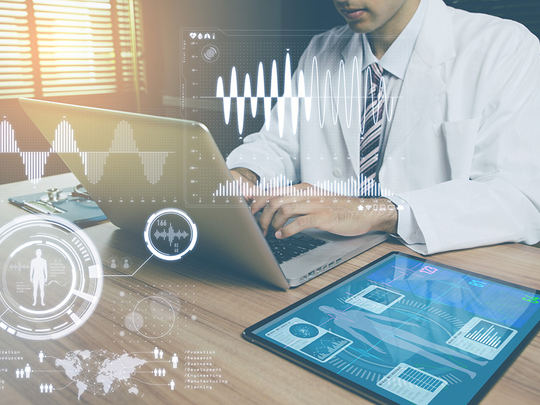
In a move to ensure convenience for patients, DHA is focusing on further strengthening its telemedicine programme, especially across its primary healthcare centres.
In the last quarter of 2014, DHA implemented telemedicine in the field of diabetic eye-care for its diabetic patients who visit the primary healthcare centres.
Telemedicine benefits
Dr Manal Taryam, CEO of Primary Healthcare Sector at the DHA, said, “Telemedicine has made the lives of patients easier, it has also helped doctors with early screening and we believe this technology will go a long way in improving patient outcomes.”
Dr Nahd Monsef, Director of Health Affairs Department, Primary Healthcare Sector at the DHA, said: “In the end of 2017, DHA introduced a headache clinic in two of its primary healthcare centres (PHCs) after looking at the high volume of patients that come in complaining of headaches. To provide specialised care, the PHCs have a family physician, a neurologist and psychologist from Rashid Hospital to cater to patients at this clinic. Moreover, they use telemedicine to communicate with the neurology department in Rashid Hospital for complicated cases.”
Dr Monsef said that the headache clinic was introduced in the two biggest regional primary health centres — Nad Al Hamar and Al Barsha and that patients from other centres could get a referral to visit the clinic.
Diabetics visiting the DHA facilities no longer have to go to an ophthalmologist for their annual eye check-ups.
Dr Taryam said, “All diabetic clinics in DHA primary healthcare centres are fitted with digital retinal cameras. Patients can get their retinal check-up at the centre during their regular follow-up appointment and the films are then sent electronically to the retinal team at Dubai Hospital.”
The team examines the patient file and blood reports and correlates these with the captured images. A basic treatment plan is prescribed based on the reports and only those patients requiring further investigation need visit the ophthalmologists at the hospital.
Dr Amal Bahroun, Director of Health Centres Department at the Primary Healthcare Sector at DHA, said, “This has multiple advantages. Through telemedicine, we can detect diabetic retinopathy early on. It is cost effective because healthcare settings do not need to employ ophthalmologists across every health centre. The images can be taken by a diabetic nurse.”
Preventing blindness
Thirteen digital cameras have been fitted across DHA diabetes clinics. Dr Taryam said, “In the UAE, diabetic retinopathy is the number one cause of irreversible blindness. There are few warning signs for early detection and therefore the disease often goes unnoticed. That is why it is so important for people living with diabetes to have annual eye screenings to check for any changes in the retina or optic nerve. The earlier we detect it, the easier it is to manage the condition and prevent blindness. Research has shown that a retinal photograph, even without a dilated eye, can show the early stages of diabetic retinopathy.
“Unfortunately, many living with diabetes don’t take the time out for eye screenings and we believe that telemedicine will help combat these issues.
“For example, previously diabetics needed to visit Dubai Hospital for their retinal check-ups, however, they no longer need to book an appointment, travel to Dubai Hospital and wait for their eye-checkup. Now the retinopathy screening is part of the process when they visit the diabetes clinic at DHA primary healthcare centres.
Dr Taryam added, “The use of technology in medicine can make a huge impact in improving the lives of patients and at the DHA we are keen to harness the potential that technology has in the medical field.”











